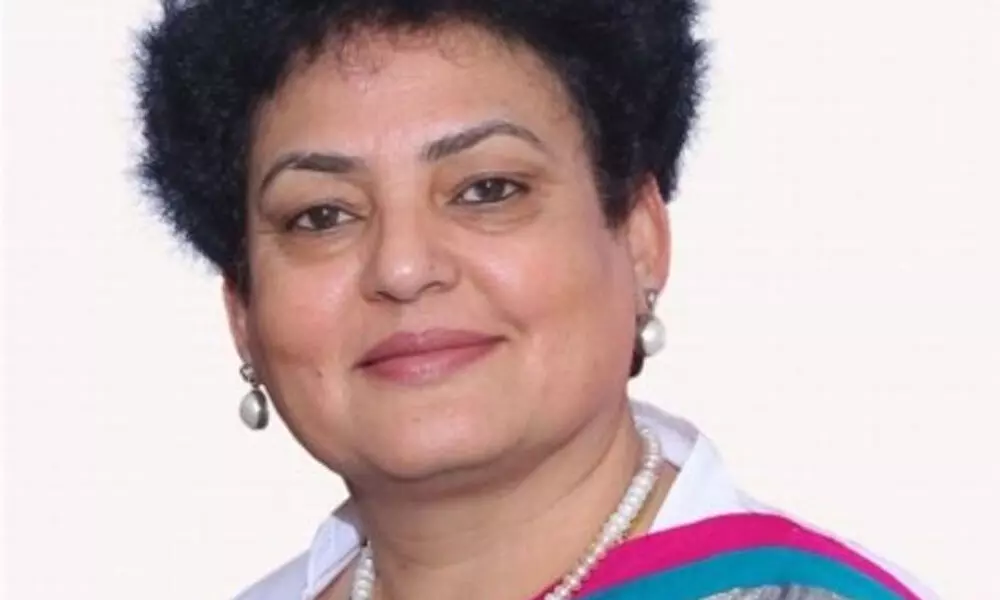NCW Chairperson emphasises on creating digital leadership among women

NCW Chairperson emphasises on creating digital leadership among women
As we recognise achievements of women across all spheres, this International Women's Day, there are all the more reasons to celebrate women power. Women across the world have fought a valorous battle against Covid-19 as frontline workers, caregivers and as leaders who dealt with coronavirus better than their male counterparts
As we recognize achievements of women across all spheres, this International Women's Day, there are all the more reasons to celebrate women power. Women across the world have fought a valorous battle against Covid-19 as frontline workers, caregivers and as leaders who dealt with coronavirus better than their male counterparts.
This year's UN Women's International Women's Day theme, 'Women in leadership: Achieving an equal future in a Covid-19 world', particularly resonates with me. It invites us to challenge and raise voices for equality, inspiring us to find ways to bring more women on the internet.
It has taught us the importance of a more gender-equal society where women get their due representation and are part of the decision making process.
Women have come a long way in breaking the existing systemic barriers and societal discrimination. However, besides the inclusive and exceptional leadership of women, this pandemic has also highlighted the underlying inequalities in the society very prominently.
In addition to the unequal brunt of the pandemic, women and girls have also had to face a shadow pandemic of gender-based violence. Women and girls have been subjected to gendered abuse online such as cyber-stalking, online rape threats and cyber bullying which intensified during lockdown. As the internet has become an extremely vital part of everyone's existence and employability, it is being increasingly viewed as a fundamental right and therefore access to safe digital space is crucial for empowerment of women.
Gender-based cyber violence against women indicates the deep rooted inequality in the society and threatens the very participation of women online. The overt pressure of online abuse and threats often lead to women self-censoring themselves which is a win for the abusers and affects the cause of gender equality adversely. Online abusers often think cybercrimes will have no consequence, therefore, besides sensitizing people to behave responsibly, encouraging women to report online abuses and to make them aware of the channels of redressal is crucial in ensuring their safety.
There are about 500 million internet users in India, but in urban areas only 40 per cent of women use the internet and in rural areas, it is estimated that there are only 31 per cent of women users. With the increase in internet penetration and usage of technology to access even basic services like education which are needed by all, it has become necessary for the people equipped with the right competencies to enhance digital literacy among the citizens. Digital literacy includes but is not limited to assisting people to use computers. It also focuses on building skills required to get necessary information to find a job, set businesses and join the global community.
The National Commission for Women has been constantly working towards creating digital leadership among women. However, we do feel that it is not the responsibility of a single entity. It is important for all stakeholders to come together.
For instance we partnered with Facebook on implementing 'We Think Digital', a global literacy programme which aims at creating awareness among women and girls about digital security and imparts them training on keeping themselves safe online. The project, which was launched in 2019 has trained more than 1,60,000 women since 2019.
Online harassment restricts participation of women in the digital space and restricts free participation and sharing of ideas. The National Commission for Women believes women should reclaim their space in every field and their equal representation online is a crucial frontier for strengthening their rights. Since internet accessibility has become a fundamental necessity for employment, decreased participation of women due to online harassment should be seen as cruelty against them. Access to online resources and space is the right of every woman and it is our collective responsibility to make the internet a safe space for women.









